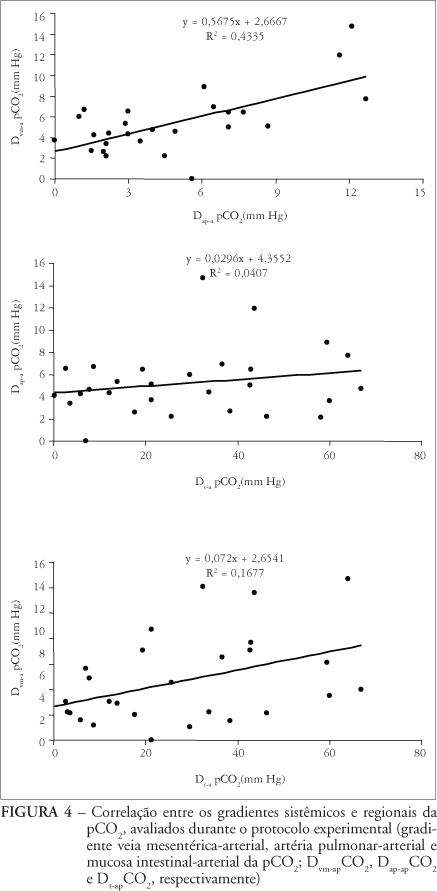BACKGROUND: Mesenteric ischemia is a life-threatening emergency with a mortality rates still ranging between 60% and 100%. AIM: To evaluate the systemic and regional pCO2 gradients changes induced by mesenteric ischemia-reperfusion injury. In addition, we sought to determine if other systemic marker of splanchnic hypoperfusion could detect the initial changes in intestinal mucosal microcirculation after superior mesenteric artery occlusion. METHODS: Seven pentobarbital anesthetized mongrel dogs (20.6 ± 1.1 kg) were subjected to superior mesenteric artery occlusion for 45 minutes, and followed for an additional 120 minutes. Systemic hemodynamic was evaluated through a Swan-Ganz and arterial catheters, while gastrointestinal tract perfusion by superior mesenteric vein and jejunal serosal blood flows (ultrasonic flowprobe). Intestinal oxygen delivery, extraction and consumption (DO2intest, ERO2intest and VO2intest, respectively), intramucosal pH (gas tonometry), and mesenteric-arterial and mucosal arterial pCO2 gradients (Dvm-a pCO2 and Dt-a pCO2, respectively) were calculated. RESULTS: Superior mesenteric artery occlusion was not associated with significant changes on systemic hemodynamics parameters. A significant increase of Dvm-a pCO2 (1.7 ± 0.5 to 5.7 ± 1.8 mm Hg) and Dt-a pCO2 (8.2 ± 4.8 to 48.7 ± 4.6 mm Hg) were detected. During the reperfusion period a significant decrease on DO2intest (67.7 ± 9.9 to 38.8 ± 5.3 mL/min) and a compensatory increase on ERO2intest from 5.0 ± 1.1% to 12.4 ± 2.7% was observed. CONCLUSION: We conclude that gas tonometry can detect the mesenteric blood flow disturbances sooner than other analyzed parameters. Additionally, we demonstrated that changes on systemic or regional pCO2 gradients are not able to detect the magnitude of intestinal mucosal blood flow reduction after mesenteric ischemia-reperfusion injury.
Mesenteric vascular occlusion; Ischemia; Intestinal mucosa; Manometry; Dogs






